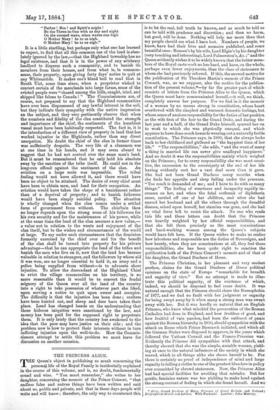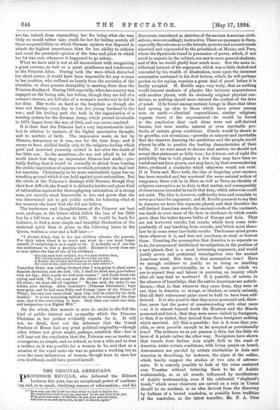THE PRINCESS ALICE.
THE Queen's object in publishing so mach concerning the persona,l life of the Royal Family is incidentally explained in the course of this volume, and is, no doubt, fundamentally sound and wise. "You must remember," she writes to her daughter, concerning the memoir of the Prince Consort, "that endless false and untrue things have been written and said about us, public and private, and that in these days people will write and will know: therefore, the only way to counteract this is to let the real, full truth be known, and as much be told as can be told with prudence and discretion ; and then no harm, but good, will be done. Nothing will help me more than that my people should see what I have lost. Numbers of people, we know, have had their lives and memoirs published, and some beautiful ones : Bunsen's by his wife, Lord Elgin's by his daughter (very touching and interesting), Lord Palmerston's, &c. ;" and the Queen evidently wishes it to be widely known that the better mem- bers of the Royal caste work no less hard, and have, on the whole, perhaps even fewer enjoyments, than the class of statesmen to whom she had previously referred. If this, the avowed motive for the publication of Sir Theodore Martin's memoir of the Prince Consort, was, as we suppose, also the motive for the publica- tion of the present voltime,*—by far the greater part of which consists of letters from the Princess Alice to the Queen, which the Queen must have communicated herself,—it will, we think, completely answer her purpose. For we find in it the memoir of a woman by no means strong in constitution, whose heart overflowed with the simplest and warmest domestic feelings, but whose sense of anxious responsibility for the duties of her position as the wife first of the heir to the Grand Duke, and during the last year and a half, of the Grand Duke himself, spurred her on to work to which she was physically unequal, and which appears to have done much towards wearing out a naturally feeble constitution. The Princess says, in 1869, that she always looks back to her childhood and girlhood as "the happiest time of her life." "The responsibilities," she adds, "and the want of many a thing in married life can never give unalloyed happiness." And no doubt it was the responsibilities mainly which weighed on the Princess; for to every responsibility she was most sensi- tive, the succession to the sovereignty at the end of her life having evidently cost her a vast deal more than it gave. She had not been Grand Duchess many months when she finds her appetite and sleep failing under the pressure. "Too much is demanded of me ; and I have to do with so many things." The feeling of weariness and incapacity rapidly in- creases on her, and when the fatal outbreak of diphtheria came, carried off one of her children, and after she had nursed her husband and. all the others through the dreadful disease, seized upon herself, her stamina was gone, and she had no vital force left to resist the attack. No one who reads this life and these letters can doubt that the Princess was heavily weighted by her official responsibilities, and that she felt them precisely as the most conscientious and hard-working woman among the Queen's subjects
would have felt hers. If the Queen wishes to make us realize how laborious and responsible are the duties of Sovereigns, and how keenly, when they are conscientious at all, they feel those responsibilities, she has been quite right to sanction the publication both of the Prince Consort's memoir and of that of his daughter, the Grand Duchess of Hesse.
The Princess Christian, in her pleasant and very modest preface, claims for the Grand Duchess of Hesse political opinions on the state of Europe "remarkable for breadth and sagacity of view." But no attempt is made to illus- trate this political sagacity, of the existence of which, indeed, we should be disposed to feel some doubt. It was natural enough that the Princess should share the Russophobia of 1877, and. we find no fault with her judgment or sagacity for being swept away by it when many a strong man was swept away with her. But it was hardly so natural that an English Princess, who knew what mischief the persecution of the Roman Catholics had done in England, and how fruitless of good, and how fruitful of vain passion, had been the outburst of panic against the Roman hierarchy in 1850, should sympathise with the attack on Rome which Prince Bismarck initiated, and which all the German States were disposed to approve, in the years which followed the Vatican Council and the Franco-Prussian war. Evidently the Princess did sympathise with that attack, and thereby showed that she was the simple, amiable woman, yield- ing at once to the natural influences of the society in which she moved, which in all things alike she shows herself to be. For there is certainly no proof of independence of mind and large sagacity in falling a victim to one of the greatest blunders in policy ever committed by shrewd statesmen. Now, the Princess Alice had had special facilities for avoiding that mistake. But her gentle, feminine nature was too yielding to make head against the strong current of feeling in which she found herself. And we • Alice, Grand Duchess of Heave, Prince* of Great Britain and Ireland Biographical Sketch and Letters. With Portrait,. London : John Murray.
are far, indeed, from reproaching her for being what she was. Only we would rather take credit for her for feeling acutely all those responsibilities to which German opinion was disposed to • attach the highest importance, than for her ability to criticise and resist the prevalent opinion of the time and place in which her lot was cast, whenever it happened to go astray.
What we have said is not at all inconsistent with recognising a great courage, as well as a great gentleness and tenderness, in the Princess Alice. During both the wars which disturbed her short career, it would have been impossible for any woman in her position, who suffered so keenly from the anxieties of the situation, to show greater intrepidity in meeting them than the Princess displayed. During 1866 especially, when her country was engaged on the losing side, her letters, though they are full of a -woman's terrors, are full also of a woman's resolve not to fail in her duty. She works as hard at the hospitals as though she were not fearing every day to lose her young husband in the war; and the leading part she took in the organisation of a nursing system for the German Army, which proved invaluable in 1870, began from the war of 1866, and was never remitted.
It is clear that the Princess had a very impressionable intel- lect in relation to matters of the higher speculative thought, and to matters of faith. The impression made on her by Strauss, temporary as it was, was for the time deep; and it seems to have yielded finally only to the religious feeling which grief and maternal yearning excited in her after the death of her little son. In the meantime, she was not afraid to let the world know how deep an impression Strauss had made,—pro-
bably feeling that it would be cowardly to shrink from bearing the public imputation of opinions to which privately she had lent -her sanction. Christianity in its more rationalistic types has no standing-ground which it can hold against pure rationalism. But
the whole of the Princess's dealings with Strauss, though they show how difficult she found it to defend a tender and pious kind of rationalism against the thoroughgoing rationalism of a strong man, are morally most honourable to her, and prove that she was determined not to get public credit for believing what at the moment she knew that she did not believe.
The tenderness and thoughtfulness of the Princess are best seen, perhaps, in the letters which follow the loss of her little
"boy by a fall from a window in 1873. It would be hard, for instance, to find a more simple and beautiful illustration of the maternal spirit than is given in the following letter to the Queen, written a -year and a half later :— "I always think, that in the end children educate the parents. For their sakes there is so much one must do : one must forget oneself, if everything is as it ought to be. It is doubly so if one has the misfortune to lose a precious child. Mickert's lovely lines are so true (after the loss of two of his children):
'Nun hat each Gott verlieh'n, was wir such wollten thun, Wir n ollten euch erzieh'n, und ihr ei ziebt nns nun. 0 Kinder, ihr erziehet mit Elchmerz die Eltern jetzt ; Ihr zieht an me, end ziehet nos anf an each zuletzt.'•
Yesterday Ernie was telling Orchard that I was going to plant some Spanish chestnut; and she said, Oh, I shall be dead and gone before they are big ; what a pity we had none sooner !' and Ernie burst out crying and said, `No, you must not die alone—I don't like people to die alone; we must die all together !' He has said the same to me before, poor darling. After Lenchen's [Princess Christian's] boys were gone, and he had seen Eddy and Georgy [sons of the Prince of Wales], his own loss came fresh upon him, and he cried for his little brother ! It is the remaining behind the loss, the missing of the dear ones, that is the cruel thing to bear. Only time can teach one that, and resignation to a Higher Will."
On the whole, this memoir is sure to excite to the full the kind of public interest and sympathy which the Princess Christian in her preface evidently expects for it. It will not, we think, bear out the inference that the Grand Duchess of Hesse had any great political originality—though other letters not given might, perhaps, establish this—but it
will bear out the conclusion that the Princess was as tender, as courageous, as simple, and as refined, as true a wife, and as true A mother, as it was possible for a woman to be, and that as a member of the royal caste she was as genuine a working bee as even the most industrious of women, though born to earn her own livelihood, could have proved herself.



































 Previous page
Previous page